Best Books
by Powell's Staff, November 17, 2023 9:16 AM
Best Nonfiction of 2023 | Best Graphic Novels of 2023 | Best Horror of 2023 | Best Romance of 2023 | Best Science Fiction & Fantasy of 2023 | Best Kids' and YA of 2023
2023 was such a great year for fiction! We had the hardest time narrowing down our list of the best fiction books of the year, but after much debate, we settled on these 23 (an appropriate number for 2023, we decided). The books on this list take place in Hawaii, Argentina, the Hamptons, a Palace in the desert, and a land of milk and honey. We’ve got campus novels and high-concept museums, fictional biographies and black holes, ugly publishing truths and gladiatorial dystopias.
We’re so pleased to present to you the best fiction of 2023, as chosen and enthusiastically recommended by Powell’s booksellers.
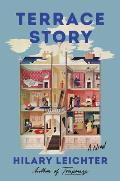 by Hilary Leichter
by Hilary Leichter
Terrace Story starts with a couple, the couple's baby, the couple's small apartment, and the couple's sort-of friend who somehow opens a portal to a terrace outside their apartment whenever she visits — and only when she visits. Where it goes from there is unexpected and absolutely heart-rending. The magic in this story is incidental to the heartache and the ways that the small choices people make glance off of each other in devastating, unexpected ways. I had no idea where this book was taking me, and I am so glad for that. Consistently surprising, filled with wonderful and aching emotional depth, and with an ending that is truly an all-timer. — Kelsey F.
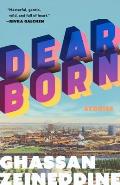 by Ghassan Zeineddine
by Ghassan Zeineddine
At first Dearborn appears to be a simple collection of vignettes about Middle Eastern life in the Michigan city for which it’s named. Then the stories begin to unfold like a map; linking characters, secrets, homesickness and hilarity together, always straining under the anxiety of post-9/11 racism and policing. A debut this tinged with panic has no business being this funny, but real life is absurd, and Zeineddine has the rare ability to give its incongruities equal weight on the page. — Mary O.
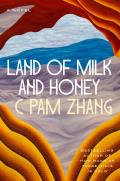 by C Pam Zhang
by C Pam Zhang
I've been screaming about Land of Milk and Honey for months — How Much of These Hills Is Gold is so good, the slightest hint of a new C Pam Zhang novel sent me into a frenzy. Her latest is about a chef who gets the opportunity of a climate-apocalypse lifetime — moving to one of the last truly habitable places on Earth, the side of a mountain above the pestilent worldwide smog that is choking out crops and animals, to cook for the ultra-wealthy retreating to the enclave. It's a meditation on appetite, on merit, on resilience, on identity and inheritance (see: the weight of the expectations and experiences of everyone's parents), on evolution, on planning and chaos, on the future we might be able to build. And, it's a love letter to food and craft and pleasure, in the face of overwhelming bleakness. I loved every word. — Michelle C.
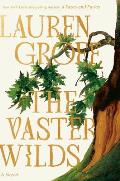 by Lauren Groff
by Lauren Groff
I read this book in three delirious days and was so frustrated whenever I had to do anything other than read it! Absolutely stunning — on its surface a wilderness adventure, at its beating heart a story of human limitation and fire to survive, of how and why one claims a home, a name, a self, of the divine, and so much more. I loved its lush and dizzying language, I loved its confidence and power, I loved its heroine. A wonder. — Claire A.
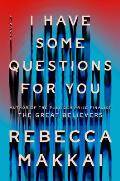 by Rebecca Makkai
by Rebecca Makkai
Makkai had me at "Hello," and by "Hello" I mean the tweet where she announced this book, calling it "the literary feminist boarding school murder mystery you didn't know you needed!"
I Have Some Questions for You is all that and more. It swims through the gray areas of memory, perception, blame, guilt, and the ways we claim ownership over narratives that are maybe not ours to claim. Even while mentally screaming “maybe don’t enable this!” to the protagonist, I blazed through with a similar single-minded need to know where this went, who did it, and what will happen now. — Sarah R.
Want to know what some of our booksellers think about I Have Some Questions For You? Check out our inaugural Book Chat Chat Room.
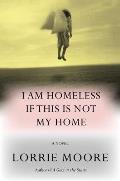 by Lorrie Moore
by Lorrie Moore
Lorrie Moore has always been a writer whose words root into my veins, setting up camp for months after I think I’m done with them. I Am Homeless If This Is Not My Home — a book about love and death and passion and grief and how all of it can be messy and muddy and bad but also sometimes, somehow, occasionally good and worthwhile — has already found a home in my bones. This book is so beautifully written and filled with such wild pathos and heartbreak. Reading it might break you, but it might heal you too. — Kelsey F.
For more, check out Kelsey F.’s Powell’s Picks Spotlight on I Am Homeless If This Is Not My Home.
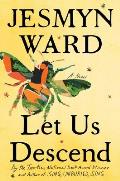 by Jesmyn Ward
by Jesmyn Ward
Sometimes a writer is so good that the mere mention of a new book from them sends a chill down your back. That said, Jesmyn Ward has a new book.
Let Us Descend is a powerful reimagining of American slavery told through Annis, a girl sold south by the white enslaver who fathered her. It is set in the brutal hellscape of the historical reality yet offers repreive in the liberating power of spiritual and ancestral memory. (As Ward said in an interview on the Powell's blog, speaking to the supernatural in Sing, Unburied, Sing: "spiritual legacy allows them, not to transcend their reality, but to access a different understanding of their reality."). Masterful work. As Ta-Nehisi Coates said: “Jesmyn is, quite simply, the best of us.” — Sarah R.
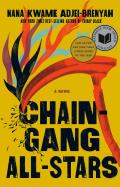 by Nana Kwame Adjei-Brenyah
by Nana Kwame Adjei-Brenyah
Chain-Gang All-Stars, the follow-up from Nana Kwame Adjei-Brenyah to his acclaimed collection, Friday Black, is a bloody, muscled novel that turns its gaze on the carceral state, violence, activism, capitalism, racism, as well as love and care and how difficult it is to break out of a system that’s so deeply entrenched in every aspect of your life. Set in a dystopic, alternate version of the present, the story follows two of the gladiators, Loretta Thurwar and Hurricane Staxxx, as they do their best to not only survive, but only live some sort of meaningful life, despite their circumstances. Adjei-Brenyah is an incredible talent. — Kelsey F.
For more, check out the Q&A that Adjei-Brenyah did for the Powell’s Blog.
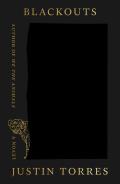 by Justin Torres
by Justin Torres
Blackouts, the long-awaited second book from Justin Torres, uses words and images to attempt to recover and illuminate stories of queer people living in the 20th century. Blackouts doesn't give its secrets away easily, or for free. Torres demands your time and focus, and earns your respect and awe. This is an experimental and moving book, sure to be read and reread in the years to come. — Adam P.
For more, check out the playlist that Justin Torres put together for the Powell’s Blog.
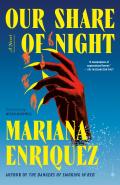 by Mariana Enriquez (tr. Megan McDowell)
by Mariana Enriquez (tr. Megan McDowell)
I really, really believe that Our Share of Night is a masterpiece. It’s such a lush book with vividly rendered, complicated characters; a world that is dangerous and slippery; and language that is so precise, you won’t be able to help being sucked into the depths of this book’s horror. I thought a lot about 2666 while reading this — the structure, the section told from a journalist’s perspective — which is a really high compliment. And the eyelids. The eyelids! Absolute masterpiece. — Kelsey F.
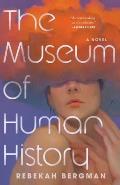 by Rebekah Bergman
by Rebekah Bergman
I loved The Museum of Human History so much! The book hops through time and follows a collection of characters in a coastal town that's attracted shiny biomedical companies trying to rush anti-aging procedures to market, mostly staying in the decades before and after a twin girl falls into a coma and stops aging. It's a very literary, heartbreaking, speculative page-turner about the tragedy of memory, and the desire to hold onto the best moments in your life, and the ways life stories are written and re-written as we move through time. I can't believe this is Rebekah Bergman's debut (there are so many sentences that made me gasp, and so many that made me cry), and I'm so excited to read everything she writes. — Michelle C.
Rebekah Bergman’s astounding debut, The Museum of Human History, breaks open questions of what you’re willing to accept in order to preserve what you might, eventually, lose; how to live in the face of dying and how to die in the face of living; what it means to be awake, and what that wakefulness requires; storytelling as an act of conservation; and the slippery connection between an imagined future and a distorted past. The Museum of Human History is a novel that aches with grief and humanity and the beauty it’s possible to find in the world, even if you vision has become crowded with loss. — Kelsey F., Powells.com
For more, check out Kelsey F.’s Powells Picks Spotlight for The Museum of Human History.
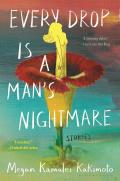 by Megan Kamalei Kakimoto
by Megan Kamalei Kakimoto
Megan Kamalei Kakimoto’s debut story collection is a knockout. In these stories, all set in Hawaii, Kakimoto explores sexuality, womanhood, coming-of-age, colonialism, class, and identity, alongside Hawaiian folklore and superstitions. Funny and surreal, beautiful and unflinching, this is a collection that’s worth savoring. — Lucinda G.
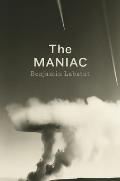 by Benjamín Labatut
by Benjamín Labatut
The existential woes that chart the passage from modern to postmodern life are laid bare in The MANIAC, Benjamín Labatut's ambitious hybrid-genre novel - "a work of fiction based on fact" - centered around the life and work of Austrian polymath John von Neumann. Von Neumann serves as the ideal avatar for a rogue, almost inhuman intelligence, easily manipulated by state actors towards calculations and inventions of undeniable evil. Labatut incorporates and impersonates a number of mad men into the narrative, a constellation of minds that coalesce to paint a picture of the previous century's calamities and speculate on a future eternally haunted by the ghosts of modernity. Dark, formally inventive, and best read in total isolation, late into the night. — Nadia N.
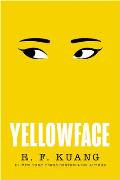 by R. F. Kuang
by R. F. Kuang
Reading Yellowface was like watching a train wreck in slow motion. In this scathing indictment of racism and tokenism in the book world, you spend the book inside the head of the deeply unlikeable and unreliable narrator, a white woman who steals a novel from an Asian author and publishes it herself. You won't be able to tear your eyes away from the pages as she scrambles to keep her secret and postpone her downfall, revealing a plethora of very real issues in the publishing industry today. — Eloise B.
Months before its release, this book is generating equal parts buzz and polarization among reviewers, which you’ll find, after reading it, is actually the most fitting reception imaginable. Yellowface is incisive, infuriating, clever, cringeworthy, deeply meta, full of ugly publishing industry truths and Book Twitter drama, devoid of likable characters and redemption. I loved-slash-hated it. — Tove H.
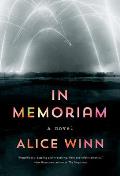 by Alice Winn
by Alice Winn
This book broke my queer little heart, beautifully. Two best friends, each secretly in love with the other, get drawn into the horror of World War I. I've never read anything that so viscerally captured the deep, inhuman dissonance of war and the deep, intuitive rightness of love at the same time. The juxtaposition between those two forces, and what it does to the people moving through them, is stunning. "Haunting" doesn't begin to cover it. I feel changed by this book. — Claire A.
More a bayonet wound than a book: In Memoriam disemboweled me, left me glassy eyed and in shock, indelibly marked me when I was done. I cried five separate times. I highlighted entire pages. I loved —loved — loved it. — Nicole S.
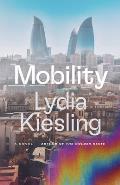 by Lydia Kiesling
by Lydia Kiesling
Mobility is a pitch-perfect look at one woman's life, a snapshot in geologic time that captures so much about how we're catastrophically harming the planet, even with the best of intentions. Lydia Kiesling gets so many precise feelings so perfectly right — workmanlike teen anxieties and activities; finding pride and ambition in a career you did not necessarily choose; prescient arcs in your personal story that only make satisfying sense to you and your memories; building a practical life while the world gently, softly crumbles and changes around you. This is a book I'll be carrying in my heart my whole life. — Michelle C.
Mobility is simultaneously a coming-of-age story and a meditation on the state of the world. It’s about finding your place in the world just as the world seems to spin out of control. Lydia Kiesling’s skillful layering of theme and compelling storytelling is an absolute masterclass. — Keith M.
For more, check out the Author Bookshelf that Lydia Kiesling put together for the Powell’s blog.
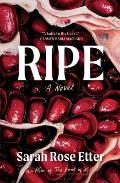 by Sarah Rose Etter
by Sarah Rose Etter
This book is such a wonderful heartache. I felt that hovering, winking black hole as I read — felt it grow like a pit in my stomach, even though I wasn't the one being buffeted around by the whims of Silicon Valley and selfish men, corporate greed and bodily needs. Sarah Rose Etter has written an astounding, sharp, deeply intimate book. I've already started recommending it to everyone I know. — Kelsey F.
Kelsey recommended this book to me, and she was right. — Michelle C.
For more, check out the Author Bookshelf that Sarah Rose Etter put together for the Powell’s blog.
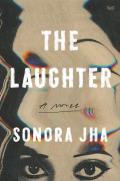 by Sonora Jha
by Sonora Jha
Sonora Jha’s newest novel is told through the perspective of Oliver Harding, a 50-something white male professor working at a college in Seattle who becomes infatuated (and obsessed) with a Pakistani colleague. Harding is about as annoying and misogynistic as you might expect from this description, and Jha certainly doesn’t pull her punches, but she uses his perspective to great effect. The Laughter is a razor-sharp, satiric, darkly funny take on the campus novel that looks at misogyny, identity politics, power, gender, and so much more. So intelligent, so finely written, and filled with twists you won’t see coming. — Olive C.
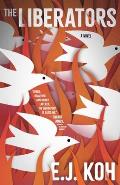 by E. J. Koh
by E. J. Koh
E. J. Koh’s debut novel, The Liberators is her follow-up to the stunning memoir, The Magical Language of Others. I was so excited to read the novel; I started as soon as I got the galley, and couldn’t put it down. The story covers decades and contents, and follows one family as its members try to figure out what it means to choose a lover, a life, a home. The relationships between the characters are so lovingly and beautifully rendered — the way they braid together, despite themselves; the small hurts that build over time; and their surprise at finding comfort and relief in another’s presence. E. J. Koh is an incredible talent. I already can’t wait for her next book. — Kelsey F.
For more, check out the playlist that E. J. Koh put together for the Powell's Blog upon the release of The Magical Language of Others.
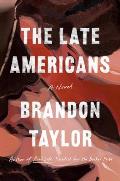 by Brandon Taylor
by Brandon Taylor
Brandon Taylor is so good, I’m gently annoyed whenever we’re not talking about him. His latest — a novel! a return to the midwest! — is a devastating look at young creatives, bridging the gap between feeling invincible and impossibly light and taking on the weight of age and experience (or acknowledging the weight that’s been accumulating all along). It’s tender, and it cuts impossibly deep. One of the best things about Taylor is his ability to write immersive, developed characters that you deeply, deeply feel (or as Lily King put it, much more accurately: “You inhabit his characters, you share their nerve endings.“). — Michelle C.
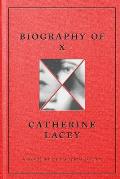 by Catherine Lacey
by Catherine Lacey
Wow, this book was a delight. As complicated and occasionally irascible as its subject, Biography of X is a meta-biography, written by the fictional C.M. Lucca, the widow of an artist named X who is determined to write the definitive account of X’s life, in the face of other, lesser such accounts. But, of course, Lucca’s quest to write about X is a difficult one, as X spent her life being elusive and deliberately obtuse (telling different versions of her history to different people, for example), so it often feels like the closer Lucca comes to the truth, the further away she really is. Biography of X dissects the mythos of the artist, and the harsh, unpleasant truths that mythos often obscures. Biography of X is such an achievement — easily one of my favorite books of 2023. — Kelsey F.
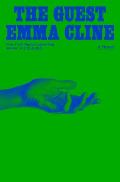 by Emma Cline
by Emma Cline
I read The Guest with my book group, and man, our text group was busy as we got to each new turn, and even busier once we got to the ending (and ending I consider perfect, honestly). Emma Cline is a master at pulling suspense out of the smallest of moments, and pressing on bruises until you’re afraid the skin might break. Alex is a young twenty-something who finds herself adrift in the Hamptons — she can’t go back to the city, because a guy back there is looking for her, but she can’t stay, because the older man she’s been seeing has kicked her out. Relying on her wits and her youthful lack of what would be well-placed fear, Alex grifts and drifts around the town, a situation that becomes increasingly untenable. This one reads so fast, partly because you just need to know if she survives the next hour, but mostly because the writing is just that good. — Kelsey F.
For more, read Keith M.’s Powells Picks Spotlight on The Guest.
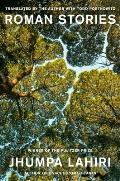 by Jhumpa Lahiri (tr. Jhumpa Lahiri & Todd Portnowitz)
by Jhumpa Lahiri (tr. Jhumpa Lahiri & Todd Portnowitz)
When Jhumpa Lahiri, an award-winning writer in English, switched languages and started writing fiction and nonfiction in Italian, her move was met, in some quarters, by shock and criticism. It's a highly unusual decision, yes, but it may also be that some male critics found it presumptuous for a woman to be so brave and climb out of her box in this way, a possibility to which she briefly alluded in her book of essays, Translating Myself and Others.
Lahiri has lived in Rome since 2012 and, in her new book, Roman Stories, she gifts the reader with myriad viewpoints on the city. There are stories from long-time residents of the eternal city, but many of the stories are told mostly from the viewpoint of outsiders, whether they be people of color from former Italian colonies who have immigrated to Rome for a better life or Americans who visit on a short holiday or for years on work visas with their families. Usually, the narratives combine these points of view as locals and new arrivals interact, at the intersection of culture, class, and personal experience. My favorite section includes a cycle of stories that takes place all up and down the Spanish Steps from the perspective of those who work at the top, those who live at the bottom, and teens who hang out in between at night on the steps to meet up romantically. There's a haunting melancholy that runs through these stories, which will leave readers thinking about the characters long after they close the book. — Jennifer R.
|